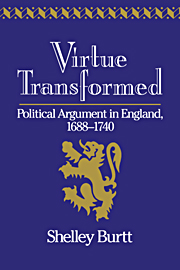Book contents
- Frontmatter
- Contents
- Acknowledgements
- 1 Introduction
- 2 The politics of virtue in Augustan England
- 3 A religious politics of virtue: Low Church Anglicanism and the Societies for Reformation of Manners
- 4 A republican politics of virtue: The selfish citizen in Cato's Letters
- 5 Bolingbroke's politics of virtue
- 6 The Court Whig conception of civic virtue
- 7 A world without virtue: Mandeville's social and political thought
- 8 Virtue transformed
- Bibliography
- Index
4 - A republican politics of virtue: The selfish citizen in Cato's Letters
Published online by Cambridge University Press: 24 October 2009
- Frontmatter
- Contents
- Acknowledgements
- 1 Introduction
- 2 The politics of virtue in Augustan England
- 3 A religious politics of virtue: Low Church Anglicanism and the Societies for Reformation of Manners
- 4 A republican politics of virtue: The selfish citizen in Cato's Letters
- 5 Bolingbroke's politics of virtue
- 6 The Court Whig conception of civic virtue
- 7 A world without virtue: Mandeville's social and political thought
- 8 Virtue transformed
- Bibliography
- Index
Summary
The pattern of political thought that we now call “classical republicanism” (or “civic humanism” or “civic republicanism”) has its roots in the work of ancient historians and statesmen who contemplated the fate of free republics, considering the conditions by which such self-governing political entities might sustain themselves through time. Its more immediate origins lie in the writings of a number of humanist scholars in Renaissance Italy who, departing from the earliest premises of humanism, asserted with Aristotle that the full development of men's moral excellences required not their withdrawal from the world but their political participation in a free community. The pressing question these “civic humanists” addressed was why such participation was fundamentally at risk in the republics of their day and how such a good might be safeguarded. Drawing on lessons culled primarily from the historians of the Roman republic, they answered that republics crumbled once their people succumbed to corruption, an internal rot characterized by the onset of avarice, ambition and love of luxury. This moral decay exposed the nation to internal faction and external conquest – the two greatest threats to liberty. Their conclusion: the survival of the free city depended on the virtue of its citizens.
Early civic humanist tracts did not always delineate the precise characteristics that constituted “civic virtue” nor did they necessarily offer a unitary conception of the good citizen. (They differed for example on whether the rich citizen represented a contribution or threat to republican liberty.) Most however affirmed the Ciceronian vision of the good citizen as fundamentally identical with the good man.
- Type
- Chapter
- Information
- Virtue TransformedPolitical Argument in England, 1688–1740, pp. 64 - 86Publisher: Cambridge University PressPrint publication year: 1992

